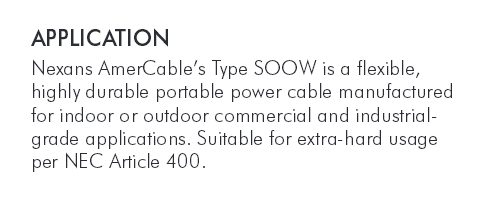Wow, hey thanks for explaining what I've already stated.
YOU were the one who said you don't see "extra-hard usage" in vendor descriptions.
Remember, all I wrote to AdamJamma was that "service" as relating to portable cable was not the same as service equipment, etc.. "Hard Service" is further divided to hard usage and extra-hard usage.
That's all.
You started off mocking this and have since questioned and/or disagreed with every aspect of portable cables. If there's a point to this, make it.
you missed the point.
the cable makers do not, repeat, DO NOT use those words when classifying or marking the cord. They literally cannot because their is no specification or marking for 'S' cord that has a designation of "not hard usage" or "hard usage" or "extra hard usage". 'J' is not a literal specification for "hard usage", its a literal specification for "300v rated". And to your point (i think) no actual spec for light/med/heavy duty usage. That appears to be cord maker words for describing their selection, where-as the "hard usage" words found on cord maker sites are back references to the words found in NEC 400.4, etc.
A cord maker could in fact make a very thick SJO, which could outperform SO in durability, possibly called "super-duper hard usage" by NEC, yet is still only rated 'J' 300v, a "junior" cord.
SJO SO SV SVT etc specifications, as used by the cord makers, DO NOT, repeat, DO NOT have "hard usage" or "extra hard usage" in them.
These usage words came from elsewhere, NEC presumably, made-up usage descriptions.
The cord makers then started to see that, hey, if i advertise our SJO cord can be used wherever the NEC says it can using the NEC words "hard usage", then i'll advertise that so folks don't confused.
because NEC is in fact quite confusing at times.
If the designations of 'S' cord had literal specifications for "hard usage" and "extra hard usages" then there would be zero need for any cord maker to advertise anything about "suitable per NEC 400.4" because you would have a direct specification on the cord saying so, AND, NEC would have no reason to use odd verbiage, it could simply call out the spec, like "spec H" because 'H' could perhaps denote a "
Hard usage" application, etc.
Another example, THWN-2. If NEC says THWN-2 is good for "heavy water environment" I don't go seek out "good for heavy water environment per NEC" at any wire maker, i simply go buy THWN-2 and make sure the wire is verified as such by the markings placed on the wire.
NEC words are one thing, actual cord/cable/wire/hardware specifications are something completely different.
I am not aware of NEC creating any specifications for anything in electrical. As was pointed out, most of the spec's comes from ANSI NEMA, IEEE, and the like.
Now, I can defend NEC on the other side, allowed and not allowed ways to apply the electrical stuff. the verbiage used is sometimes very odd, or don't provide enough clarity.
I have a 240v mobile shop drill press but, it moves around maybe 3-4x a day in the shop. do i need SJ or SO cord?


